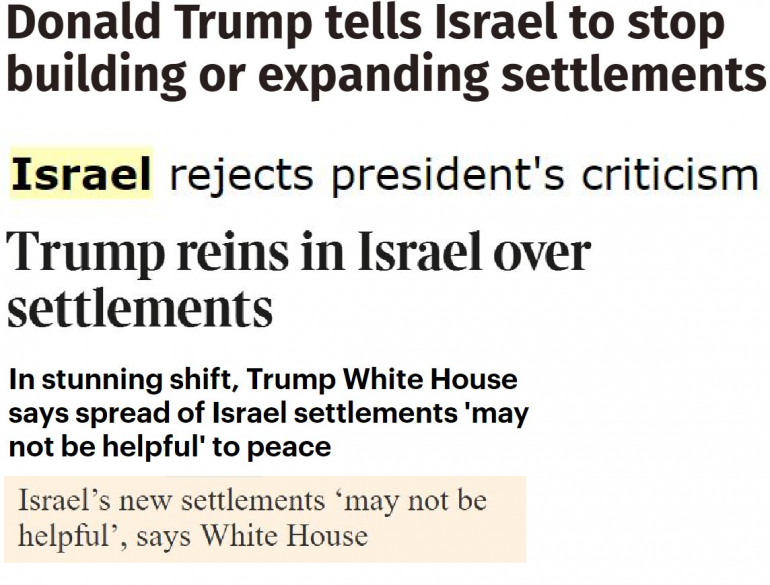Here’s the entire text of a Feb. 2nd statement by the White House Press Secretary concerning the US position on settlements, per our Tweet on Friday.
To help hold the media responsible to accurate reporting on the issue, here's the text of the White House statement https://t.co/zUiNUn0x2G pic.twitter.com/p3L6BqsFvJ
— CAMERA UK (formerly UK Media Watch and BBC Watch) (@CAMERAorgUK) February 3, 2017
Here’s a quick break down of the statement :
- The US desires peace between the Israelis and Palestinians
- The existence of settlements is not an impediment to peace
- However, the construction of new settlements or the expansion of existing settlements beyond their current borders may not be helpful in achieving peace.
The second bullet point is extremely important in the context of of US-Israeli relations, as it reverses decades of US positions characterising settlements as an impediment to peace. The third bullet point merely takes the position that ‘new’ settlements and the expansion of existing settlements beyond their current boundaries are “not helpful” in achieving peace. The White House makes a clear distinction between construction within existing settlement boundaries and construction beyond those boundaries, including entirely new settlements.
Since there hasn’t been a new settlement in over two decades, and the overwhelming majority of new construction within the last 20 years – including most of the announced construction since Jan. 20th – was in existing settlement boundaries, the White House appears to be arguing that most settlement construction is not an impediment to peace.
However, most UK media reports on the announcement focused not on the White House position that settlements don’t impede peace, but instead on the muted condemnation (as “not helpful”) of new settlements and construction beyond existing boundaries.
The Independent’s headline accompanying a Feb. 3rd article ignored the White House view that settlements aren’t an impediment to peace, and instead focused entirely on their criticism of some settlement construction.
 Of course, the White House statement – which the Indy did include in their article – did not “tell Israel to stop building or expanding settlements”. It merely stated that such construction may not be helpful to ending the conflict. In fact, the Indy journalist completely ignored the part of the White House statement on settlements not impeding peace.
Of course, the White House statement – which the Indy did include in their article – did not “tell Israel to stop building or expanding settlements”. It merely stated that such construction may not be helpful to ending the conflict. In fact, the Indy journalist completely ignored the part of the White House statement on settlements not impeding peace.
Times of London’s headline also obfuscated the White House position on settlements, in a Feb. 3rd article by Louis Emanuel.
 Like the Indy, Times of London, in a Feb. 3 article, ignored the historical significance of the White House view on settlements, as not representing an impediment to peace, whilst characterising the muted criticism of new settlements. and construction outside existing boundaries, as “a break from the president’s previous position”.
Like the Indy, Times of London, in a Feb. 3 article, ignored the historical significance of the White House view on settlements, as not representing an impediment to peace, whilst characterising the muted criticism of new settlements. and construction outside existing boundaries, as “a break from the president’s previous position”.
The Telegraph also downplayed the White House view of the settlements as not an impediment to peace. Here’s the headline of a Feb. 4th article by Raf Sanchez in their print edition.
 The Telegraph article also all but ignored the significance of the White House view that settlements are not an impediment to peace. It focused instead on the soft criticism of some settlement construction, as well as the Israeli reaction to that muted criticism.
The Telegraph article also all but ignored the significance of the White House view that settlements are not an impediment to peace. It focused instead on the soft criticism of some settlement construction, as well as the Israeli reaction to that muted criticism.
The Daily Mail, in a Feb. 3rd article by Geoff Earl, also focused almost entirely on the White House critique of “new” settlements and settlements beyond existing boundaries, whist all but ignoring (with the exception of a brief mention in the strap line) their view of settlements and peace.
 Finally, a Financial Times report by John Reed again all but ignored the White House’s rejection of the prior conventional wisdom that settlements represents a major impediment to peace.
Finally, a Financial Times report by John Reed again all but ignored the White House’s rejection of the prior conventional wisdom that settlements represents a major impediment to peace.
The only place Reed mentions the new White House position on settlements and peace is when citing the text from the White House statement.
The one exception to the otherwise uniformly misleading reporting on the issue by the British media was the Guardian, whose Feb. 3rd article (by Peter Beaumont and Julian Border) was accompanied by this clear headline:
 The opening paragraph reinforced the accurate headline and provided important context to the US position:
The opening paragraph reinforced the accurate headline and provided important context to the US position:
The Trump administration has broken with longstanding US policy by saying Israeli settlements in Palestinian territory are not “an impediment to peace” but cautioned that a further expansion “may not be helpful” to ending the conflict.
Whatever your views on Trump or the settlements, the articles at the Independent, Times of London, Daily Mail, Telegraph and Financial Times obfuscate what can arguably be characterised as a “stunning shift” on longstanding US policy that Israeli construction across the green line represents an obstacle to peace.





